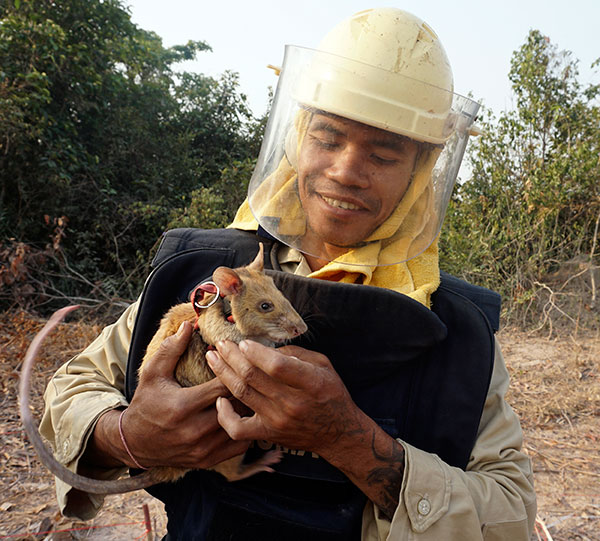'Smart rats' used to clear land mines
Updated: 2016-02-25 08:48
(China Daily)
|
|||||||||
 |
|
Land mine removal expert Ok Chann plays with a rat trained to find buried mines, on Friday. The African rats use their sensitive noses to detect the explosives. DENIS GRAY/ASSOCIATED PRESS |
It's been a busy morning for Cletus, Meynard, Victoria and others of their furry band. Tiny noses and long whiskers twitching, they've scurried and sniffed their way across 775 square meters of fields to eliminate a scourge that has killed thousands of Cambodians: land mines.
Meet the Hero Rats: intelligent, surprisingly adorable creatures with some of the most sensitive noses in the animal kingdom. Sent from Africa, where they successfully cleared minefields in Mozambique and Angola, they began the same task in northwestern Cambodia early this month and have already scored tangible results.
Two hectares have been declared mine-free around this village where more than 15 people have been killed or wounded by the explosives, forcing some to abandon their homes and rice fields and seek jobs elsewhere.
One villager, Khun Mao, said the rats have been sniffing for suspected mines in a rice field he had been afraid to cultivate for years. He said that while it is too soon to say whether the rodents can remove every mine, "To me, these rats are wonderful."
"The villagers have started to get excited about farming their land again. You can see the light in their faces," said Paul McCarthy, Cambodia program manager for the Belgian nonprofit organization APOPO, or Anti-Personnel Land Mines Detection Product in English.
On a recent morning, the African giant pouched rats were working two suspected, taped-off minefields. Each rodent wore a harness connected to a rope strung out in a straight line between two handlers standing about 5 meters apart and outside the danger zone. The rodents then darted from one handler to the other, constantly sniffing the ground and only taking time out to scrub their bodies with tiny front paws or to answer nature's call. The handlers moved a step or two down the field to repeat the process, and a second rat was later sent over the same terrain to double check.
Two-year-old Victoria proved particularly swift-"very active", one team member calls her. She stars in APOPO's "adopt-a-rat" fundraising drive.
Learned response
At the second field, Merry and Meynard were completing three hours of effort as a midday sun beat down on the parched earth.
The duo had earlier nosed in on an explosive, halting just above it and scratching the ground-the learned response when a rodent detects TNT inside a landmine. A deminer with a detector followed and the mine was dug up and detonated.
Unlike standard mine detectors, the super-sniffers pick up only TNT and not other metal objects. And unlike wage-earning humans, the rats work for peanuts-and their other favorite, bananas.
Theap Bunthourn, operations coordinator for the 34-member team, cited other advantages of using rats: They are cheaper to acquire and train than mine-sniffing dogs and easier to transport.
Today's Top News
Tech giants reveal 5G innovations in Barcelona
Mechanism to be built to monitor ceasefire in Syria
London mayor says to support Brexit in EU referendum
What ends Jeb Bush's White House hopes
UK to hold EU referendum on June 23
US saber-rattling could spark arms buildup: experts
Balkan, Austria police agree to register refugees
Turkey blames Kurds, Syria for attack
Hot Topics
Lunar probe , China growth forecasts, Emission rules get tougher, China seen through 'colored lens', International board,
Editor's Picks

|

|

|

|

|

|






